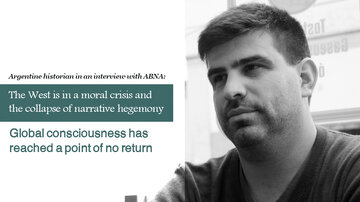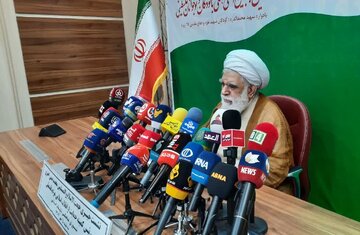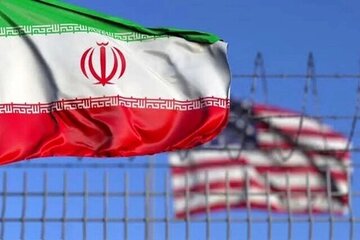AhlulBayt News Agency (ABNA): The Administrative Ethics Session, with the lecture of Ayatollah Reza Ramazani, Secretary-General of the AhlulBayt (a.s.) World Assembly was held on Wednesday morning, May 14, 2025, with the participation of the Assembly’s directors and staff at the conference hall of the Qom headquarters.
Speaking on the topic of administrative management from an Islamic perspective, Ayatollah Ramazani stated, “In an Islamic system, management must first be based on Fiqh (Islamic jurisprudence); secondly, it must be grounded in modern knowledge and science; thirdly, it must be centered on ethics; and fourthly, it must be Wilayah-based, (that is, loyal to the leadership rooted in divine authority). The very Wilayah concept must be manifested at all levels and signifies guardianship combined with compassion.”
Highlighting the need to reform perspectives in the workplace, the Secretary-General of the AhlulBayt (a.s.) World Assembly said, “There are important discussions regarding this perspective reform, which are beneficial for individual and organizational growth. Firstly, the workplace should be seen as a space for spiritual elevation and a setting for worship, because the work environment is an arena for social conduct and growth. In this sphere of social life, there are inherent obligations. It is no longer about ‘me,’ but ‘us.’ The more shared values increase, and differences diminish, the more the organization becomes a successful example of social living.”
“We must avoid viewing our environment through a materialistic lens,” he continued, “for if our perspective becomes material-oriented, we will face problems, and conflicts and disputes will quickly arise. Therefore, we must adopt a spiritual outlook toward the workplace. In the West, ethics have been reduced to codified behavior, and morality there is merely behavioral, with no relation to God or the Hereafter. This is because their view of administration is based solely on a humanistic approach, in which there is no place for divine revelation, God, or the Afterlife.”
The senior instructor at the Islamic Seminary of Qom added, “In systems where spirituality prevails, where God, the Hereafter, and the eternal destiny of human beings are placed at the center, one’s outlook in the workplace fundamentally changes. Abu Dharr al-Ghifari said, ‘I entered the mosque and saw the Holy Prophet (p.b.u.h) alone. I asked him what was contained in the scriptures of Abraham.’ He replied, ‘All of it is stories.’ One of those stories is that a person must be insightful and aware of his era, and know the context in which he stands, so he can move forward accordingly. A wise person must understand the position he occupies and avoid extremes.”
In another part of his remarks, Ayatollah Ramazani emphasized the importance of adhering to Fiqhi and Sharia-based obligations and prohibitions. “If these religious do’s and don’ts are properly understood and observed, the organization will flourish,” he said. “Work is one of the religious obligations (wajibat), but any obligatory act can be imbued with devotional intention (niyyat) and performed for the sake of nearness to God. According to our religious teachings, even actions like eating, drinking, speaking, teaching, learning, and responding to clients can be undertaken with the intention of seeking closeness to God, because worship is the prelude to servitude.”
Ayatollah Ramazani stressed the need to reform one’s perspective in the workplace, saying, “This is within our control and is connected to our inner self and intention. From the vast body of teachings of the AhlulBayt (a.s.), we derive the firm belief that work is a place for worship. Martyr Motahhari, in his book Education and Training, states that work is both a means of spiritual refinement and an act of worship. When such a meaning becomes present in the workplace, the workplace becomes a paradise. Therefore, work must be performed firmly and with precision; it must not be done lazily or carelessly. In fact, according to a narration from the Holy Prophet (p.b.u.h), even the placement of the lahad (the stone laid over the dead body in the grave according to Islamic sharia) must be arranged with order and precision, as all tasks must be executed with excellence.”
Emphasizing the importance of timeliness, he stated, “A task that can be completed in a single day should not be delayed for a week. Unnecessary delay in completing tasks is religiously prohibited (haram).”
The Secretary-General of the AhlulBayt (a.s.) World Assembly added, “Work must be performed for the sake of God. When someone is granted the opportunity to serve people, he must be grateful. Moreover, in the workplace, an individual who serves within a religious system and has been trained in the school of the AhlulBayt (a.s.) must not be jealous. Of course, if an injustice occurs, it must be reported to the relevant authorities.”
Concluding his remarks, he stated, “We must reassess and reform our work environments, aligning them with the teachings of the AhlulBayt (a.s.).”
**************
End/ 345





